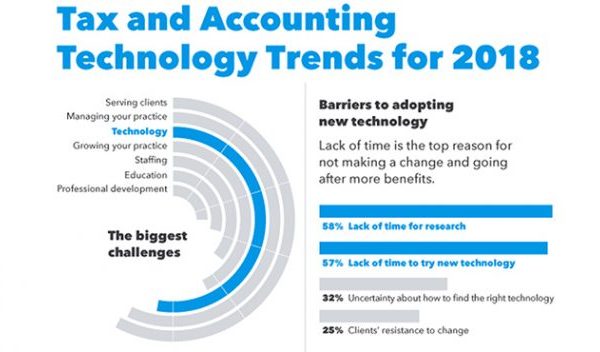I have spent more than 25 years working for public accounting firms of all sizes, from the largest in the world to my own solo practice. Thankfully, I still look forward to tax season, so either I am a glutton for punishment or I have found my calling in life. I was lucky to have worked with firms in the past that had the resources and the ability to work from anywhere, and to work with clients all over the world. The term “hoteling” was something I did in the ’90s, and like anything else, you learn to adapt. I carried my laptop with me wherever I went, and my laptop had a lock that I used to attach to wherever I was hoteling. That was my office.
The large firm experience led me to look for affordable solutions to manual processes for my own firm. I have been testing different cloud solutions for years and am still amazed every time I find a new solution. Documenting processes and procedures that work is as important as remembering what did not work for your firm or client. And the programs are constantly changing, so a program that did not work for you or a client last year or five years ago may have been updated—and is now just what you need. A narrow mind has no place in the cloud!
The programs are constantly changing, so a program that did not work for you or a client last year or five years ago may have been updated—and is now just what you need.
My personal virtual work plan started after I bought my first home in 1998. The gentleman I purchased the home from was a snowbird. He lived in Kentucky in the warm months and the rest of the year in Florida. I decided I was going to do the same exact thing when I retired, hopefully sooner rather than later. I would live in my old Kentucky home in the warm months and the rest of the year somewhere on a beach in Florida. I had plenty of time to plan to make this goal of being a snowbird a reality. And what better place to be during tax season than somewhere on a beach listening to the waves hit the shore? Tax season in the Ohio River Valley is cold, and there is always a threat of snow and/or rain. Recently a friend posted on social media that, on average, our area has 176 sunny days and some kind of precipitation 121 days per year.
The plan for a virtual tax practice: This would require me to access technology in the cloud, work with clients from anywhere, and manage staff remotely.
Access technology in the cloud
QuickBooks® Online Accountant works great for my firm and clients. It has just one login to track all your work and clients. In QuickBooks Online, my staff is able to work in the same version, same release, and same file in the cloud. There is no worry about backups, different versions, or years. I have access to all my QuickBooks Online clients from anywhere. Here’s how I manage the work.
QuickBooks Online and related programs
I use the Work feature in QuickBooks Online Accountant to manage my practice. I can create, assign, and track projects from start to finish using this feature. I can send messages to clients, request documents, and include due dates, so we get what we need on time.
The Accountant Toolbox is an accountant-only feature that allows the accountant to reclassify transactions, run trial balances, export tax-ready data, void and delete transactions, and quickly access management reports and charts of accounts.
Bank Feeds allow you to download, categorize, and update transactions automatically with a secure link between QuickBooks Online and your financial institution. This feature has cut the bank reconciling time for most clients to almost no time at all. It also downloads and keeps a copy of the bank statement in the program. This is a nice feature— now we no longer have to request bank statements from the client.
I send invoices by email with QuickBooks Online and allow my clients to pay online as well.
Using QuickBooks Payments, your clients can pay directly through the link in the email they receive, and the invoice is recorded as payment received in QuickBooks. Once the payment is funded to your bank, QuickBooks is updated and the deposit is recorded. There are no checks in the mail to take to the bank or entries to record in QuickBooks. QuickBooks Online also allows you to see when clients have viewed your invoices with a time and date stamp. So if you have not received payment, you could check to see if the client overlooked the email, and if so, send a reminder.
I still have clients who use desktop accounting programs. I have the ProAdvisor® Enterprise Software bundle that includes all the desktop QuickBooks programs. The best product is what works best for your client and running their business. I know some firms have tried for years to get clients to conform, and use apps in the cloud to connect and replace their desktop versions, but I do not. I offer solutions, but that is it. It must always be up to the client to decide what is best for their business, just as we must decide what is best for our practice.
ProConnect tax and integrated software
QuickBooks Online integrates with Intuit ProConnect™ Tax, our cloud tax software. You can import the client data directly into ProConnect Tax and automatically map it to the tax form with the Prep for Taxes feature. The Prep for Taxes feature in QuickBooks Online is a huge timesaver, and you can add all the client documents and back up to the tax return in the folders. Once this is set up, the numbers populate the tax return on an annual basis. So unless there has been a change from the prior year, the numbers should transfer from QuickBooks Online to ProConnect Tax directly, and then you can check the numbers in ProConnect Tax. There is nothing to download, install, maintain, or back up. The integration between ProConnect Tax Online an QuickBooks Online helps with accuracy as well, since you are not entering the data manually.
I use Intuit Link, a free, secure online portal through which clients can upload and download documents. This is included with ProConnect Tax software at no additional cost and is extremely easy to use. Intuit Link has templates and questionnaires for you to send to clients, which saves me time and ensures I do not forget anything. Clients can securely upload their data. Data can be imported from Excel, a scan, mobile capture, or downloaded directly from the provider. This reduces manual input errors by importing data directly from the client documents into the program.
The e-file dashboard allows me to see the status of all the tax returns and keep an eye on rejections. This feature really helps me sleep well at night. There is always a worry that a client will not get a return filed in a timely manner, and, of course, this dashboard is your go-to place to verify that returns have been submitted and accepted by the taxing authority. The e-file status in the Tax Hub is new, and you can view the critical e-file information, including e-file status history and submission ID.
ProConnect Tax stores data on Intuit firewall-protected, redundant servers, accessible anytime from anywhere. All the information is protected through encryption.
I can access ProConnect Tax through the QuickBooks Online dropdown menu, and I really like this feature. Not having to log in to another website is nice for me.
My tax returns are all over the board, so I wanted a program that was cost-efficient for my easier tax returns and yet all-inclusive for my complicated tax returns. ProConnect Tax has the forms I need at the right price. It is easy to navigate, and I feel confident using the program to complete all of my tax returns. The diagnostics take you directly to issues that need to be resolved.
For ProConnect Tax and QuickBooks Online, I can give staff access to certain clients and give them different user levels as well. These features allow users to have different permissions.
One of my favorite things for tax year 2022 was the ability to select what reports were included with the client copies and save the option for all my returns. My returns are complicated, and this feature allowed me not to have to either do a partial every time I print them or select certain pages in the PDF itself to print to another PDF.
I use eSignature powered by DocuSign for engagement letters and electronic signatures. eSignature is integrated with ProConnect Tax, helping me eliminate this administrative part of the tax workflow without leaving my tax software. The document is sent via a secure file. The client digitally signs the document, and the status of their progress is updated in real time on the software dashboard. This is IRS-compliant and ensures client data is safe in the signing process with highly secure encryption technologies. Clients now expect to electronically sign documents and really like the ability to do so. It saves time, and they are able to create an account and keep the documents in one place.
Intuit Tax Advisor
One new program I started using this year is Intuit Tax Advisor. This program is a game changer. There are tools in the program that take the data from the tax return and create custom tax plans in minutes. I have clients reach out all the time who want to convert from a Schedule C to an S Corporation. This program allows you to run the scenario with little to no work involved, so offering tax advisory services is a breeze. Sole practitioners now have access to tools that large firms have had for years. The reports are easy for the clients to understand and quantifies the tax savings, which is all they really care about anyway. In the past, I had to manually create different scenarios in Excel or create an entirely new client file. There was a great deal of workaround to get what I now have access to in this tool.
When I look at any program as a solution for my practice, it must fit my needs. I do not want to cause myself more work or workarounds to get to the final product. Price is a concern, but it is not at the top of my list. If the cost of one program is more than another, but saves me time, then there is the reason to justify a higher price. I think sometimes we overlook the actual cost of the program if we take into consideration the time savings. That time savings goes straight to the bottom line. Positive feedback about program features from real users is important. When a technology stack works for my firm or a client, it truly is an amazing thing!
Working with clients remotely
Larger CPA firms match staff experience with client needs, so if I have the expertise in Kentucky and the client is in California, they get a virtual introduction and we take it from there. Virtual meetings are the only way to meet unless you get on a flight to meet in person, but the unnecessary cost and time of these face-to-face meetings are overrated. Virtual meetings are now the new norm. And while that phrase makes me cringe a little, it is true, and you either embrace it or your competition will.
I really like virtual meetings, not just for clients, but also for internal meetings. Facebook Messenger allows you to create groups of people and video chat at any time. Zoom is great for virtual meetings, and you can just use the voice feature if you do not want to use video. You can record the Zoom meetings and make them available to the client, so if a partner is not available to attend a meeting, they can still listen to the meeting at another time.
The key to a successful client relationship—and any relationship, for that matter—is communication. And the problem with text and emails is that only the sender and receiver know the context of the words they send and receive. Virtual meetings are essential to let the client know about what to expect for the year as far as processes, cost, and timing; tax law changes that impact them, or new credits that they are eligible for; and final review of the tax return.
Working with staff remotely
We are now a remote workforce, for the most part. Finding talent continues to be a challenge for all firms. The playing field has changed, and we have tech-savvy graduates who do not want to live to work. There must be stellar training and continued engagement with staff for this to work; offering a remote workplace can be one way to attract these graduates.
Finding talent continues to be a challenge for all firms. The playing field has changed, and we have tech-savvy graduates who do not want to live to work.
There are some technology best practices that have been key to us working successfully as a remote firm. All of our calendars are shared so we know when we are working, as well as scheduled appointments and time off.
Slack is another option to connect with staff and track conversations. A simple text message to check in on a project or task is something staff appreciates, and allows the person to know they can ask questions if they need assistance.
There are several tools for practice management that have also been helpful for our firm. For example, assigning staff to clients in QuickBooks Online Accountant and ProConnect Tax is a great tool. In addition, the Work feature in QuickBooks Online allows you to create projects and designate staff to complete them. You can also create client requests and see exactly what needs to be completed for each client.
Virtual team meetings via Zoom once a week are a great way to keep the team on task and go through the open items of the week. These weekly meetings allow everyone to discuss what is going on and make sure we’re aligned on priorities,. You can also form some personal connections.
Technology aside, I have one other tip for working with staff remotely. Remember that working remotely means different things to different people. Some people will still get up at the same time every day and work from 8-5. I have always been flexible on the start and stop time, and on the days staff work. I personally do my best work in the afternoon while someone else works best in the early morning. Consider what kind of flexibility you can offer your staff members while still ensuring the best outcomes for clients.
What’s best for your firm
In the early days of starting our own business, we tend to think all clients are good for us. As our firms evolve, some of us develop a niche. The clients we want to work with will gravitate toward us based on our areas of expertise, and the clients who are a better fit for another will exit—or we refer to someone who is a better fit.
Reviewing your client base on an annual basis is a great practice, because not every dollar of revenue is a good dollar. I have made a lot of money from clients I dreaded, and while the money was great, my time with them made me miserable. I eventually break up with the clients who are not a good fit for my firm, but only after I attempt to make the relationship work. We all know who the bad ones, are and look back and are grateful never to have to deal with them again. The great clients are like family and sing our praises to everyone they know. I highly recommend the annual client grading system. We all know the Pareto Principle: 80% of our profits come from 20% of our customers. I try to work smarter, not harder.
The tech stack for your firm depends on your size, client base, the work you perform, and your budget. This needs to be reviewed at the very least on an annual basis as well. Technology is constantly changing, and somewhere there is a developer working on a solution to a manual process you or your firm are currently performing. I have always had the opinion there is more than enough work to go around. Talking to other CPAs to see what works for them is extremely valuable. For example, I meet regularly with CPAs I have worked with in the past to discuss current events in our industry to share the challenges and what has worked for me.
I also attend trainings from Intuit, the Kentucky Society of CPAs, AICPA, and apps I am interested in, among others. There are so many to choose from: QuickBooks Connect, Intuit tax trainings, and several virtual conferences. I attended QuickBooks Connect in person last year, and it was awesome! If you have not attended in the past, it is worth every penny. I highly recommend it!











